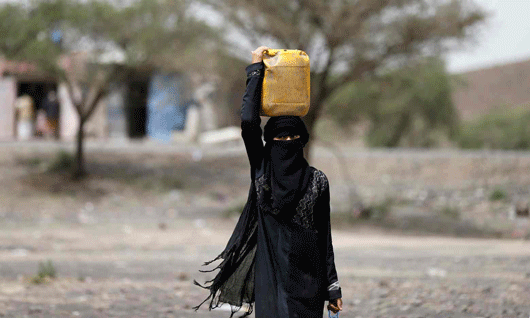
By Lydia Tinka
Yemen, once known as "Happy Arabia", may be heading towards famine in one of the biggest crises of our time. Of its 24 million people, over 80% are in need of assistance in order to survive.
I recently had access to some cut off areas near Taiz, one of the cities worst affect by fighting in Yemen. I was in Al Hawban, a suburb about 2km from Taiz city. Most people from the city have moved there due to the conflict.
What I saw there was more devastating and desperate than I could ever have expected; people living with no water or electricity, struggling to find enough food to survive. The air strikes are frequent in the area. The explosions are louder than you can imagine. The ground shakes, buildings rattle. People leave the streets early and hide in their homes, shops close at 3pm in the afternoon - sometimes earlier if bombing is constant.
Already one of the poorest countries in the Middle East before the fighting began in March 2015, Yemen has always relied heavily on imports. Around 90% of its food comes from abroad, including 85% of its staple grain crops. Airports, ports and land routes have now been forced to close, either due to damage or blockades. As a result most imports have all but stopped. Now, an invisible food crisis seems to be pushing almost a quarter of the population to starvation.
The effects of this are obvious. The number of people begging on the street has increased. I saw women carrying children ask for help to whoever passes by. Food prices are through the roof. Almost everyone I met told me they can only just manage to eat once a day. Sometimes they eat nothing.
As well as the lack of supplies coming into the country, Taiz, one of its biggest cities, has been sealed off since September 2015. This has resulted in the loss of livelihoods for tens of thousands of families. Production has declined and mass internal displacement has severely disrupted an already limited agriculture. All this has caused prices of basic commodities to sky-rocket.
The cost of a minimum staple food basket for an average family has doubled since the crisis began. A staple food basket covers the very basics like flour and rice, and doesn’t include any fresh produce like tomatoes, onions or even meat, which are an essential part of Yemeni cuisine and important for any balanced diet. Even bread, the most integral part of a Yemeni meal, is becoming very scarce.
The price of bread has risen by 60%. Flour mills have been forced to close and, as a result, bakeries now operate at less than half their usual production rate. Portion sizes have reduced, meaning a piece of bread that used to weigh around 60 grams, has reduced to 40 grams. Worryingly for many families in Taiz bread is now their only source of nutrition. This means that some people are living on just one piece of bread each a day, if they’re lucky. Children are also increasingly seen rummaging through the garbage in search of someone else’s leftovers.
Even when other essential goods are available, people are being forced to travel long distances to get them. Families are travelling up to 30km on foot, along treacherous mountain routes, just to reach the nearest affordable market. For those not able to make the trip, the only hope is to count on the good nature of neighbours, skip meals, beg or starve.
One person I spoke to has lost everything. When the fighting started, his family was able to escape. However, he was stuck at work and cornered by the fighting. He’s been alone ever since. An educated man with a respectable, skilled job, his home has been destroyed in the fighting and he can no longer work.
Let’s be clear, Taiz is a battle zone. What I saw there, one wonders how anyone can survive. Yet the resilience and determination I saw in people, even those on the brink of starvation, is what I can’t forget.
Walking around when there was no shelling, it seemed calm. People were on the streets, life seemed almost normal. For a moment, you could almost forget.
The situation in Yemen has gone beyond the scope of aid. Yemen is facing the catastrophic reality of famine unless people can return to the fields, imports resume and markets are able to trade at normal prices.
As leaders sit down to discuss Yemen’s future we hope a cessation in the violence will allow, in the short term, for much needed aid to reach people living in some of the most inaccessible areas. In the longer term, we can only hope for peace.
Source: The Guardian, Edited by Website Team